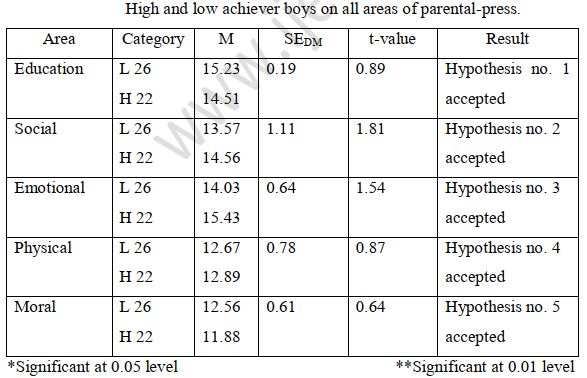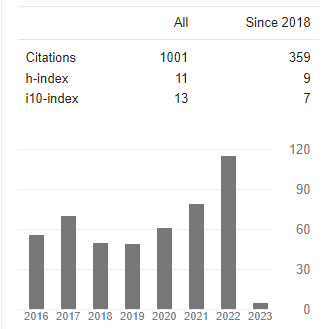PARENT-CHILD INTERACTION AND ACADEMIC ACHIEVEMENT: AN EXPLORATION
Abstract
Different kinds of parenting style impact the development differently on the adolescents. It is necessary for the parents to provide best possible environment at home, to create a conducive, fostering and supportive experiences for smooth transition from adolescence into adulthood. The parent-child relationship consists of combination of behaviour, feelings and expectations that are unique to a particular parents and a particular child. The relationship involves the full extent of a child’s development. Th quality of parents-child relationship is affected by parent’s age, experience and self confidence and the stability of the parent’s marriage. The study was conducted to find out the difference between low & high achiever boys and girls when all areas of parental-press taken as dependnt variables. By using random sampling technique, a sample of 250 students was selected from Samba district in Jammu and Kashmir state. Parental-press inventory was used to measure the awareness of parents in five areas of child’s education and the personality in which parents take interest. In the present study t-test was used to find out the difference between two means. Result of the study REVEALED significant difference between low and high achiever girls in emotional and moral areas of parental-press.
Downloads
References
Baumeister, R.F., Campbell, J.D., Krueger, J.I., Vohs, K.D. (2003). Does High Self-Esteem Cause Better Performance, Interpersonal Success, Happiness, Or Healtheir Lifestyles? Psychological Science in The Public Interest. 4(1), p.1-44.
Baumrind, D. (1966). Effects of Authoritative Parental Control on Child Behaviour. Child Development, 37, 887-908.
Bean, et. al. (2003) The impact of Parental Support, Behavioral Control, and Psychological Control on the Academic Achievement and Self-esteem of African American and European American Adolescents. Journal of Adolescent Research, 18, 523-541.
Boutelle, K., M.E. Eisenberg, M.L. Gregory and D. Neumark-Sztainer, (2009). The Reciprocal Relationship Between Parent – Child Connectedness and Adolescent Emotional Functioning over 5 years. Journal of Psychosomatic Research, 66:309-316.
Colarossi, L.G., & Eccles, J.S. (2000). A Prospective Study of Adolescents’ Peer Support : GEnder Differences and the Influences of Parental Relationships, Journal of Youth and Adolescence, 29-661-678.
Craig, L. (2006, April). DOES FATHER CARE MEAN FATHERS SHARE ? A Comparison of How Mothers and Fathers in Intact Families Spend Time with Children. Gender & Society, 20(2), 259-281.
Dalton, W., Frick-Horbury, D., & Kitzmann, K. (2006) Young Adults’ Retrospective Reports of Parenting by Mothers and Fathers : Associations with Current Relationship Quality. Journal of General Psychology, 133(1), 5-18.
Dembusch, S.M., Ritter, P.L., & Leiderman, P.H. (1987). The Relation of Parenting Style to Adolescent School Performance. Child Development, 58, 1244-1257.
Englund, M.M., Luckner, A.E., Whaley, G.J.L., Egeland, B. (2004). Journal of Educational Psychology, 69(4), P723-730.
Herbert, J., & Stipek, D. (2005). The Emergence of Gender Differences in Children’s Perceptions of their Academic Competence. Journal of Applied Developmental Psychology, 26(3), 276-295. Holly, W. (1987). Self Esteem : Does it Contribute to Student’s Academic Success? Oregon. School of Study Council, University of Oregon, Eugene, OR.
Hoovser et. al., (2001) Parental Involvement in Homework. Educational Psychologist, 36, 195- 209.
Huffam, L.C., Mehlinger, S.L., & Kerivan, A.S. (2000). Risk Factors for Academic and Behavioral Problems at the Beginning of School.
14. Keith, et. al., (1998) Longitudinal Effects of Parent Involvement on High School Grades : Similarities and Difference Across Gender and Ethnic Groups. Journal of School Pschology, 36, 335-363.
Kraft-Sayre, M., and R.C. Pianta. (2000). Enhancing the Transition to Kindergarten. Charlottesville, Va.: University of Virginia, National Centre of Early Development and Learning. Israel, G.D. and Beaulieu, L.J. (n.d).
Lian, T.C. and Yeoh, S.H. (2008). Parental Bonding and Parent-Child Relationship Among Tertiary Students. Sunway Academic Journal 5, pp. 111-127.
Noller, P. (1994). Relationships with Parents in Adolescence : Process and Outcome. In R. Montemayor, G.R. Adams & T.P. Gullotta, (Eds.), Personal Relationships During Adolescence, (pp. 37-77). Thousand Oaks, CA : Sage Publications.
Pomerantz, E.M., Altermatt, E.R., Saxon, J.L. (2002) Making the Grade but Feeling Distressed Gender Differences in Academic Performance and Internal Distress. Journal of Educational Psychology, 94, 396-404.
Prior, M., Sanson, A., Smart, D., & Oberklaid, F. (2000). Pathways from infancy to adolescence : Australian Temperament Project 1983-2000. Melbourne : Australian Institute of Family Studies.
Pullmann, H. and Allik, J. (2008). Relations of Academic and General Self-esteem to School Achievement. Personality and Individual Differences, 45, p. 559-564.
Rimm-Kaufman, S.E., & Pianta, R.C. (2000). An Ecological Perspective on children’s Transition to Kindergarten : A Theoretical Framework to Guide Empirical Research. Journal to Applied Developmental Psychology, 21(5), 491-511.
Rozumah, B and Z. Nor Shereen, (2009). Relationships with Father and Mother, Self-esteem and Academic Achievement College Students, American Journal of Scientific Research, 6, 86-94.
Sandefur, G.D., Meier, A.M. and Campbell, M.E. (2006). Family Resources, Social Capital and College Attendance. Social Science Research 35, 525-553.
Seiffge-Krenke, I., G.Overbeek and A. Vermulst, (2010). Parent-child relationship trajectories during adolescence: Longitudinal associations with romantic outcomes in emerging adulhood. Journal of Adolescence, 33: 159-171.
Singh, et. al. (1995). The Effects of Four Components of Parental Involvement on Eighth-Grade Student Achievement : Structural Analysis of NELS-88 Data. School Psychology Review, 24, 299-317.
Somayeh, K and B. Rozumah, (2009). Parenting Style in a Collectivist Culture of Malaysia. European Journal of Social Science, 10(1):66-73.















